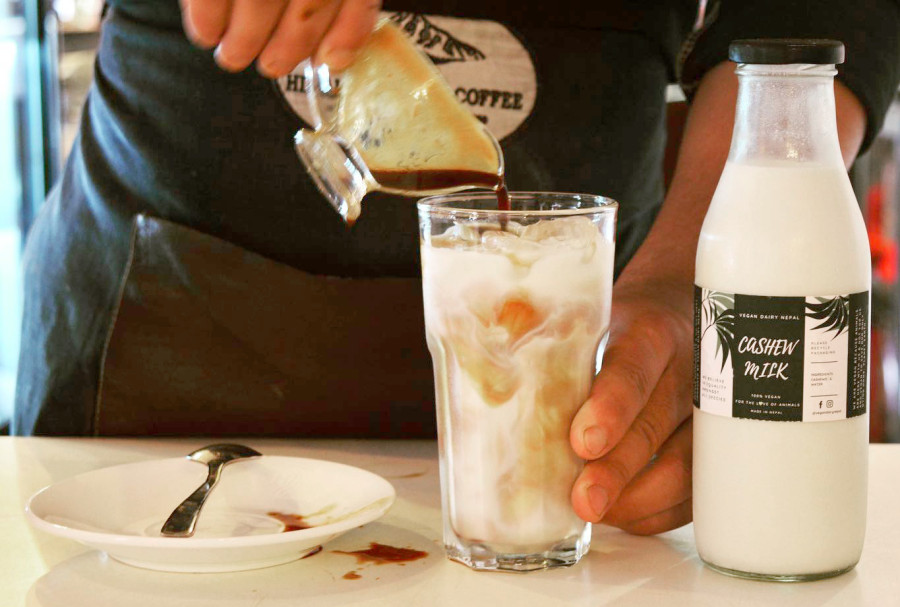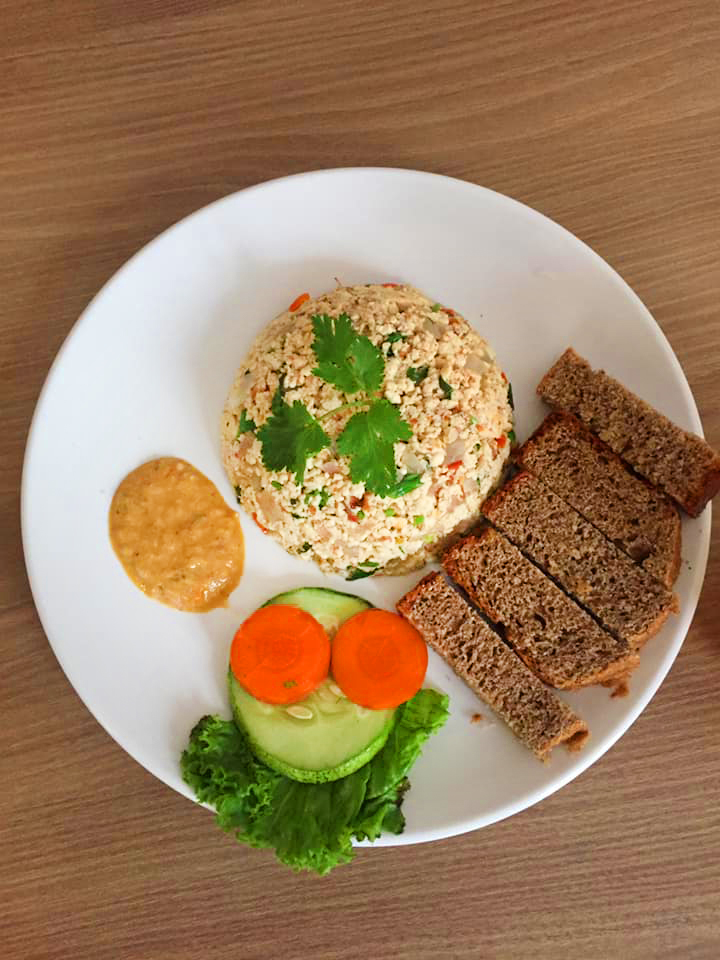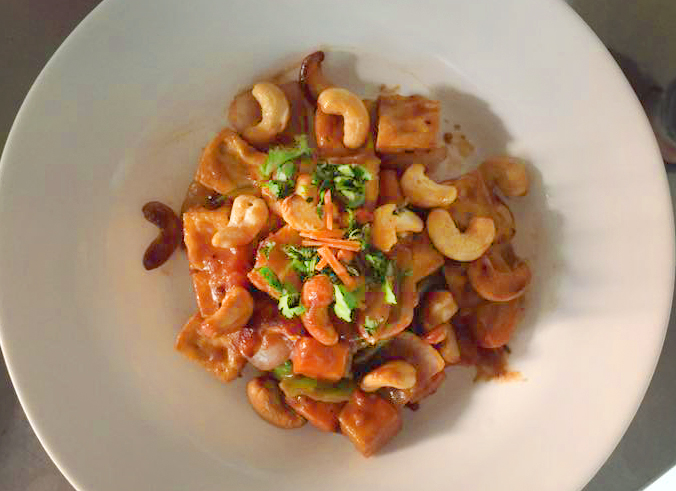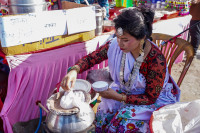Food
The newest trend in town—veganism
More people are becoming vegan in Kathmandu—and they say it’s not difficult to be one.
Abani Malla
Sophiya Maharjan always had trouble feasting at her family’s bhoj. She was a pescatarian in a ‘typical Newar family’, which meant traditional meals—that mostly comprised of meaty dishes—were consistently a problem. If she was lucky, there would be paneer dish set aside for her.
Despite all this, Maharjan took her diet further last July, going as vegan as possible, amid her concerns for the environmental impact of consuming animal products—so now she rejects paneer dishes too.
Over recent years, more and more young people are becoming vegans—for many reasons—and Nepali society is slowly responding to a vegan person’s dietary and overall lifestyle demands.
Veganism, by definition, refers to a solely plant-based diet and product consumption, abstaining from the consumption of products or foods containing animal products. Nepal has long been a vegetarian-friendly nation, with a fasting culture that, at times, encourage meat-eaters to become vegetarian briefly. But given most of the vegetarians here follow a lacto-ovo-vegetarian diet, where one’s meal includes dairy products and eggs, complete abstention from animal products has never been a norm.
“There wasn’t much general awareness about what veganism was,” says Maharjan. “When I visited some reputed bakeries last year, they didn’t know what it is either.”
The idea of veganism was originally coined in 1944 by Englishman Donald Watson, who founded the Vegan Society, but the practice can be traced back to ancient Indian and eastern Mediterranean civilisations, according to an article by Time.
In Nepal, like its other South Asian counterparts, vegetarian lifestyle is not a new concept. It has been a part of many religious beliefs. Religions such as Hinduism, Buddhism and Jainism have ‘Ahimsa’, which promotes kindness, compassion and non-violence towards all living beings.
Although religious reasons also contribute to veganism or vegetarianism in Nepal, the emerging vegan community in Nepal is more influenced by modern concerns, such as animal rights, environmental concerns and health reasons.
Anish Tuladhar, a yoga instructor, has been adapting to the lifestyle for the past five years, ever since he made a vegan friend. Tuladhar had become a vegetarian when he was 14 years old, and always hated to see animals constitute his, or anyone’s, meals.
“Whenever I imagine the taste of meat in my mouth, it makes me feel guilty,” says Tuladhar, who turned vegan majorly for animal rights. It took him only six months to transition into the lifestyle, abandoning products produced with anything from an animal. Five years since the change, he has moved from using candles, leather, or any other product that reminds him of his guilty dinner plate.
“Apart from spending 15-20 minutes explaining what I don’t want in my food to a waiter, transitioning into a vegan was easier than I had thought,” says Tuladhar.

For 28-year-old Maharjan, however, it has proven difficult to deal with denying food and having to explain her lifestyle. Part of that is when she travels throughout rural Nepal for her job. Offering milk-tea is considered a sign of respect in many parts, for example, so it’s difficult to abstain and lecture well-meaning locals on veganism, says Maharjan, who identifies as a flexi-vegan.
But for Valley denizens, thanks to a handful of pure vegan eateries and several restaurants that offer vegan options, going vegan isn’t very difficult.
After being a vegan for fifteen years Samu Yonzon opened Loving Heart in 2013, supposedly the first fully-vegan eatery in Kathmandu. Yonzon says the reason she opened the restaurant was that she couldn’t find a vegetarian restaurant, let alone a vegan place, when she wanted to eat out.
“Many questioned why I would open a vegan eatery at a place where people mix meat with every vegetable,” says Yonzon.
Foreigners were once Yonzon’s frequent customers, and she received a few locals too. But when Yonzon moved Loving Heart to Thamel two years ago, she was surprised to see many Nepali vegans coming in.
“It feels good to meet Nepali vegans, and even non-vegans, appreciating the taste of plant-based cuisine,” says Yonzon.
C-Ya Vegan Food and Coffee is a newcomer to Kathmandu’s vegan scene, having opened in Jhamsikhel three months ago. Even for a newly opened vegan restaurant, the business is running smoothly. At the moment, up to 30 people visit the restaurant every day, according to the co-founder Nirmala Gurung.
Gurung and her partners ventured into the business after coming to believe the “negative impacts of dairy products” for one’s health. While the founding group had some doubts regarding how the restaurant would fare, they faded once young locals started visiting.
It is unclear exactly when Nepal started seeing more vegans. But according to Buddha Shrestha, owner of French Bakery in Chhetrapati, one of the few bakeries in Kathmandu to provide a vegan and gluten-free menu, the demand for vegan food has risen over the past three years.
After the 2015 earthquakes, Shrestha met foreigners asking for vegan bakery items. While he was aware of veganism from his 10 years of experience in Australia, he didn’t include animal product-free items because there was virtually no local demand. But since 2015, Shrestha has included vegan options with regular vegan customer base of about 25 Nepalis.
“I haven’t circulated any advertisements, but people come asking if this is the vegan bakery they were looking for,” says Shrestha.
Even at Aniyor Veg and Vegan Restaurant, which relocated to Thamel from Durbarmarg in 2017, the flow of customers ordering vegan meals has increased to approximately 90 percent in the past three years.
“The concept of veganism wasn’t around and local guests would hardly visit us when we started,” says Gauri Dixit, the restaurant’s owner. “But now it seems many Nepali youths have turned vegan.”
For 23-year-old Kajol Sethia, co-founder of Vegan Dairy Nepal which produces vegan-based dairy substitutes, being a vegan was an overnight decision when she was in Singapore four years ago. But for Sethia, Nepal is a more “vegan-friendly” place than Singapore. Although she imports her cosmetics from abroad, for food, Sethia finds more options in Nepal.
“Nepali cuisine is already vegetarian,” says Sethia, referring to the dominant dal-bhat and tarkari combo. But having vegan options at restaurants and fully vegan eateries means she is able to eat at least one meal a day outside, says Sethia.
Even for essentials, the Nepali market has plenty of handmade and plant-based products on sale, especially when one wanders the streets of Thamel. From hemp-based bags and clothing to plant-based soaps and nettle fabrics. With a prevalence of emerging entrepreneurs in Nepal, environmentally friendly and cruelty-free products are generally available in the local market. Brands such as Paila shoes are dedicated to being sustainable while April shampoo and conditioning bar is vegan and palm-oil free.
But even amidst such availability of required goods, being a vegan in Nepal comes at a cost. Not everyone is fully aware of the practice yet. For Tuladhar, who has been a vegan for the past five years, the lifestyle once seemed impossible.
“I had a notion that being a vegan was only possible abroad,” says Tuladhar. “But I was wrong. It’s much easier here, especially now.”
Following the vegan lifestyle does help one to be soundly aware of what they eat, say vegans, but there have been doubts whether the diet provides enough nutrients for the body. One complaint is that the diet could lack Vitamin B12 and protein.

However, when Tuladhar visited a doctor upon experiencing pain in his knee, he was surprised to know that he’s suffering from uric acid. “Apparently, we get a lot of protein from grams and beans,” says Tuladhar. “So whenever people doubt the plant-based diet, I tell them this story.”
According to dietician Rashmi Bajimaya, in the vegan diet, soy products are the major protein supplier and one can achieve more protein from consuming legumes with grains, and fermented food. However, vitamin B12 is deficient in the vegan diet as it can only be obtained from micro-organisms.
While the human body requires a little amount of vitamin B12, one’s immunity can decrease over time and the person can get lethargic.
“Going vegan is a thing in Nepal now,” says Bajimaya, who is a full-time dietician at Human Organ National Transplant, Bhaktapur. “But one should properly intake foods that provide them proteins in a balanced amount.”
Sethia alone knows roughly 200 practitioners within and outside the Valley such as Dharan, Pokhara, and parts of Tarai through her business. Tuladhar can also count 20 vegans he knows and sees many transforming into one whenever they encounter at events such as Animal Rights March.
But with growing awareness and restaurants and businesses slowly adapting to change, veganism may thrive in the Valley within the next few years. Although the cost might be a little more for the plant-based meat substitutes, restaurant owners are trying to make them affordable.
“That’s [pricing] all we have in our mind for now wondering had we not have to import materials from abroad,” says Gurung of C-Ya. “If only we could make vegan food cost less, many would visit us for the love of good food.”
And for vegans in Nepal, they’re just adapting and contributing for an individual change. “Some call me ‘snobbish’ or a picky eater,” says Maharjan. “But I’m just taking control of my efforts to make a difference.”




 9.83°C Kathmandu
9.83°C Kathmandu










